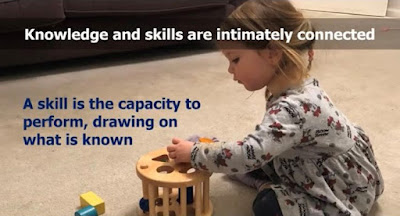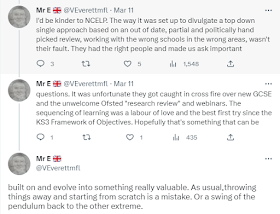This morning, Isabelle Jones posted a link to this interesting blog post on Novice learners and Expert learners.
As MFL teachers, we have met this concept in the Ofsted Research Review. It says that most of our learners are Novices. And only a few pupils at the higher levels of GCSE are in any way to be considered starting to reach Expert level. Expert pupils may start to cope with extracting meaning from texts with unknown words and be able to start to communicate and express themselves. But for most of our pupils, Ofsted mandate a concentration on explicit knowledge of phonics, grammar and high frequency vocabulary. Communication, self expression and reading that involves deduction and inference of meaning should be delayed until pupils are Expert.
Behind this there is a noble and extremely complex idea. It is a view of education which does away with the old idea of "ability". Instead of labelling some pupils as able and others as less able, it asks us to look at where those differences between pupils start to appear, how they are reinforced, and how they become self-fulfilling.
It is closely linked to the idea of cultural capital and the importance of knowledge. Specifically to the idea that "skills" and abilities can be broken down into knowledge. By thinking in terms of "skills" and "ability" we have loaded the dice against pupils who don't have the same level of cultural capital to start off with. We have allowed some pupils to fly and some pupils to sink, explaining it away with the concept of "ability," effectively blaming (or praising) the pupils.
Instead of this, we are now exhorted to think not of the skills, but of the knowledge. Some pupils with a slightly better starting point, get a head start and are labelled as "able." Other pupils may be missing some knowledge and have a slower start and seem unable to perform the skills we ask. What is the knowledge that needs to be put in place? What is that knowledge that pupils who do well have, and other pupils lack?
Lovely ideas. And ones that perhaps teachers have always approached through working carefully with pupils as individuals, nurturing their attempts and their skills, watching very carefully to pitch the level of challenge and support.
But a child-centred approach is out of fashion. It is portrayed as being the opposite of what is supposed in the previous paragraph. It is portrayed as being a lazy, coasting approach with too much play and not enough ambition. We also have a fashion for defining the curriculum with rigorous sequencing, rather than a focus on classroom pedagogy and the pupil's development. And perhaps we are also a nation of Novice teachers, with a dearth of experience. And of course, teachers love to be offered a formula, a magic bullet, some pseudo science, a bandwagon, a fad.
You will have guessed, that the Novice-Expert distinction is one I am uncomfortable with. So why don't I like it? For a start, the idea that content can be broken down into knowledge is the easy part. Especially if we then test for recall of that knowledge. It can appear to be very successful. But the idea that "knowledge is key to acquiring skills" part of the deal can end up being completely forgotten. I have written here about how the rush for knowledge can be at the expense of thinking, creativity, expression, experimentation.
The Novice-Expert distinction legitimises this. It demands that we teach knowledge first, so that skills can come later. Much later.
I would say that this is an idea that doesn't stand up on its own. The post I referred to at the start almost acknowledges this by at the same time as setting up the Novice-Expert distinction, declaring that we need to see it as a continuum. Thank goodness. But once we forgo the attractive neat binary distinction, there's not a lot of the idea left.
Because it is part of a bigger idea. The bigger idea is that there is a very interesting relationship between knowledge and skills. And how we INTEGRATE the teaching of knowledge and skills is really important.
People blurt out the mantra, "But you need to know things before you can think."
This shocking image from an Ofsted video has been circulating on Twitter, shared by Early Years Teachers.
You may think it chimes with what I just said about the importance lying in how we integrate the teaching of knowledge and skills. But the context is that of a video stipulating explicit teaching of knowledge. And the caption on the picture makes it clear that knowledge comes first before a skill can be performed. With a picture of a child playing with a shape-sorter.
Surely playing with a shape-sorter is the absolute paradigm that explicit knowledge does not come first. When we say some pupils lack cultural capital, it may well be that they missed out on the opportunity to play with shapes. Not that they missed out on having it explained to them.
But it's the same right through to Secondary School. And even in "knowledge based" subjects like Physics. If you are going to learn Newton's First Law, you need to confront how you think about how things move. You may well think that if you push things they move. And if you stop pushing them, they stop moving. This is thinking. The science teacher wants you to examine this idea and discover that there's a better way of explaining it. Things do stay still until something pushes them. But things also stay moving until something stops them. If under the guidance of a teacher, you start with your thinking, observe objects moving, come to a new conclusion, then you are learning. If someone tells you the knowledge, "Every object will remain at rest or in uniform motion in a straight line unless compelled to change its state by the action of an external force" then that's not going to mean anything.
Of course, no-one is advocating that. Knowledge-based teaching is very careful to engage with prior knowledge and pitch the level of challenge so that it moves the pupils forward but doesn't overwhelm. But this does rather clash with the idea of "You can't think without knowledge." Learning happens by thinking, engaging with content. You can theoretically split thinking, knowledge, learning. You can theoretically split skills and knowledge. But in practice, what matters is how they are integrated.
In language-learning this is reflected in the debates around form and meaning. Or learning and acquisition. Or explicit and implicit learning. While the distinctions are useful for debate, the whole point is the interaction, the integration, the synergy, the balance.
In Languages, my parents' generation learned grammatical forms as a purely intellectual exercise. But since then it has been axiomatic that you don't delay the learner's ability to express themself until the grammatical system is mastered. We construct a curriculum which balances the pupils' ability to say things, with their evolving conceptualisation of the language. And the two are in no way incompatible. Conceptualisation of the language is what allows you to say more things. Wanting to try out saying more things is what drives conceptualisation of the language.







